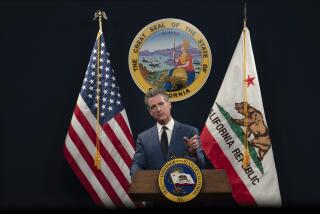Phase In New Revenues Before New Tax Reform
Logic and politics do not always coexist peacefully. Sometimes they must cooperate surreptitiously or not at all. Keeping that reality fixed in view may be the key to resolving the tangle over deficits, tax reform--and tax increases.
Congress and President Reagan agree that deficits must come down. They agree that the tax code should change. The arguments all concern how and when to adjust spending and revenues to produce those happy results. Sorting them out is proving to be rather a chore.
Reagan is an anvil on which all blows for tax increases shatter. Despite his perseverance in cutting domestic spending, he has chosen to treat efforts to restrain growth in certain cost-of-living allowances as off limits to those searching for revenues. Some tax-reform concessions that he made to GOP House members would involve significant additional revenue losses and compound the difficulty of making such legislation “revenue-neutral.”
Yet there is apparently one chink in the President’s anti-tax armor: He has given the impression that he would not rule out absolutely and adamantly some “revenue enhancements” as part of a suitable tax-reform package. Therein may lie salvation.
The free fall of the President’s budget proposals in the House, together with developments in the Senate Finance and Budget committees, suggests that the moment is at hand to refocus efforts at synchronizing these contending impulses.
Two able and determined Senate chairmen, Bob Packwood (R-Ore.) and Pete V. Domenici (R-N.M.), are struggling to craft legislative packages that will pass muster on the Hill--and move the country onto a sound economic path for the longer term. Both are faced with the need to find new revenues--Packwood to cover the dollars lost to tax reform, Domenici to meet the strictures of Gramm-Rudman.
Packwood has worked hard to avoid contaminating tax reform with a bruising battle over a tax increase. His game plan centers on offsetting revenue losses by a number of devices that would increase Treasury collections by tens of billions.
Domenici, trying to rally a coalition of pragmatists in both parties, does propose to bite the bullet by boosting taxes more than $70 billion over the next three years. The deficit-reduction deadlines give him little leeway, and he has staked out a forceful, independent position. Waiting until the 11th hour next fall would only strengthen the Administration’s power to impose a settlement on its terms.
In a message crafted by Minnesota’s Rudy Boschwitz, half the Senate has already told the President that Domenici’s task is more urgent than Packwood’s, that a bargain on reducing the deficit must take priority over tax reform. The senators have their priorities right, but there is another way to enforce them.
Without trying to back the President down on his anti-tax position, Congress could still link his demand for tax reform to the necessity for new revenues to trim the deficit. The trick lies in phasing in new revenues before revenue-losing reforms.
This is not as easy as it sounds, but the concept can be made to work. Packwood emphasizes that in the perennial war between tax simplification and tax fairness he tilts the balance toward fairness. A two-track phasing of revenue gains and revenue losses would add complexity to a reform bill that is already stupefyingly complicated. But it is a manageable complexity that could contribute to relieving the unfairness involved in many of the deficit-reduction options.
Reagan himself applied the principle of phased tax relief in the tax cuts of his first term. Without distorting the substance of tax reform, the same principle could go far toward easing the impasse over the deficit. For example, particularly in the face of sharp declines in oil prices, the case for energy-related taxes has grown. It remains reasonable to raise some revenues that way, perhaps dropping them as the deficit shrinks. Some oil-based revenues might go for a portion of the President’s defense demands in exchange for using the bulk of them on the deficit.
If Congress and the President can agree on the stringent deficit controls of Gramm-Rudman, and if they can eventually come to terms on a true tax-reform plan, there is no reason they cannot also agree on a scheme to phase in some reforms faster than others. The reform process may be the only way to coax the Administration toward hard decisions to enhance revenue.
Many times in the last 40 years, moderate Republicans have been the linchpins between the two parties, the two houses and the two policy-making branches. Arthur Vandenberg, Jacob Javits, Howard Baker--they and others built the bridges that made possible breakthroughs to historic decisions.
Bob Packwood and Pete Domenici stand in that tradition. Their labors in 1986 will likely provide America’s fiscal bridges to the next century.
More to Read
Get the L.A. Times Politics newsletter
Deeply reported insights into legislation, politics and policy from Sacramento, Washington and beyond. In your inbox three times per week.
You may occasionally receive promotional content from the Los Angeles Times.










